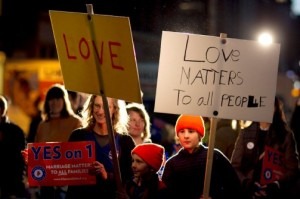The movement for same-sex marriage has certainly made major strides in the past couple years, but has never had a day like Election Day 2012, when voters in three states approved gay marriage and a fourth shot down an attempt to ban it.
What makes last week's election historic? Well, In 2004, Massachusetts courts legalized gay marriage, and since then courts or legislatures have done the same in five other states. But until last week, voters had not followed suit. Since the late 90's, a total of 32 states had voted on same-sex marriage, and each time the majority of voters opposed it. Yet, 2012 saw the issue go 4-0 in its states.
Yes, voters in Maine, Maryland and Washington chose to legalize gay marriage in their states--the first time that public vote decided to allow same-sex marriages to occur. In Minnesota, voters turned down Amendment 1, which would have banned gay marriage in the state.
This follows a monumental shift in public opinion on the matter. A CNN poll showed that a majority of Americans (54%) think that marriage between two men or two women should be legal. While this is a sharp rise from earlier this decade, it is also the fifth straight time since March 2011 that a majority has favored it. The same poll said the number of Americans who claim to know that someone close to them is gay is now 60%, up from 49% just two years ago.
With 41 (potentially 42?) states still not granting full legal recognition of marriage, the fight is certainly not over. Proponents across the country (including in Pennsylvania, California, and Florida) are gaining a full head of steam due to the victories last week. Opponents, of course, have not conceded defeat in those states, and have vowed to continue to fight.
When asked by PBS Newshour if the 2012 election was a turning point, Thomas Peters, the cultural director for the National Organization for Marriage, responded: “No, not at all. I think these were tactical wins. Going into these four state fights we had no illusions. These are deep blue states, we were vastly outraised by our opponents. And even despite all those political forces against us, we still managed to have very close margins in the final tally. What I'm hearing this week is that it's not a big shift. We are encouraged to double down, to renew our efforts.”
Opinions on the issue will remain sharply divided for some time to come. However, after 32-straight defeats at the polls, it's clear the momentum is now in another direction.
